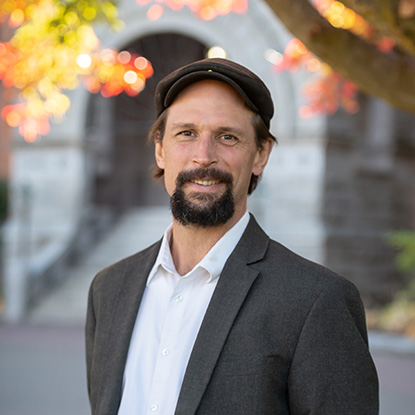I grew up on Greenbluff, just north of Spokane and spent a good deal of my teenage years working in the strawberry fields and apple orchards in the summer and wrestling in the winter, but reading books all year! As an undergraduate at Gonzaga I was deeply moved by my time studying European philosophy and Liberation theology with the Jesuits and after a semester studying with Jon Sobrino at the University of Central America in San Salvador, I decided to spend my life teaching philosophy in the Jesuit tradition. For the next 10 years, I spent March through August fishing on commercial salmon, crab and halibut boats out of Petersburg, AK and studying philosophy, September through February, in Galway, Ireland under the tutelage of Felix O’Murchadha. During my time there I fell in love with Roisin Lally, a fellow PhD student in philosophy, and we are now married with three children: Laura, Maria Anne, and Ciara.
I have been at Gonzaga for 10 years, and I regularly teach Human Nature, Ethics, Phenomenology, and Hermeneutics, along with an array of less regular courses in more specialized areas. My research focuses on the intersection of phenomenology and religion, particularly around questions of presence, desire, illusion, and the sacred. I have recently written on Plato, Augustine, Teresa of Avila, Kierkegaard, Paul Ricoeur, Richard Kearney, Julia Kristeva, Luce Irigaray, Hossein Nasr, and the philosophy of film. A sample of that work, and the places it has been published, may be found on my Academia.edu page. I am currently finishing a book provisionally titled: Desire and Method: Truth and Illusion in Phenomenology, Hermeneutics, and the Discernment of Spirits
Articles and Book Chapters:
“Materiality and the Sacred in Anatheism”, The Art of Anatheism, Eds. Richard Kearney and Matthew Clemente. (forthcoming)
“Cosmos and World: Sacred Imagination as the Erotic and Conatic Poles in a Poetics of Being”, Analecta Husserliana: The Cosmos and the Creative Imagination. (Forthcoming.)
“Brokenness and Hope: David Lynch’s Contribution to a Phenomenology of Anxiety in Mulholland Drive.”, Journal of Speculative Philosophy. Vol. 29, No 2, Summer 2015.
“Ligatio ex Nihilo: An Alternate Path through the Darkness of Kierkegaard’s Phenomenology of Anxiety.” , International Philosophical Quarterly, Vol. 55, No. 1, March 2015, pp 85-100.
“From Up in the Air to the Roots of Pandora’s Tree of Souls: Hossein Nasr’s Islamic traditionalism and the hope for Western futures grounded in the Sacred.”, Cinema: Journal of Philosophy and the Moving Image. Vol 4. (2013), pp. 28-43.
“From the Wounded Self to the Sacredness of Being: The role of psychoanalysis in the philosophy of Paul Ricoeur and Julia Kristeva,” Presencing EPIS: A Scientific Journal of Applied Phenomenology and Psychoanalysis. Vol 2. (2013), pp. 1-16.
“Memory and Authority: Sovereignty, Commemoration, and the Limits of the Present” (with Felix O’Murchadha) in Liebsch, B (ed.): Versöhnendes Vergessen? Gedächtnis und Geschichte nach Ricoeur. Berlin: Akademie Verlag, 2009.
“From Text to Non-Action.” Journal de Phänomenologie. No 21. (Spring 2004) pp. 25-32.
Book Reviews:
Reimagining the Sacred, by Richard Kearney. Notre Dame Philosophical Reviews. (July 2016) pp. 1-8.
William Desmond and John D. Caputo, by Christopher Ben Simpson (Indiana U. Press) Teaching Philosophy. Vol. 34, No. 2. (June 2011) pp. 166-170.
Themes: The Sacred, Desire, Beauty, Art, Anxiety, Guilt, Presence, Alterity, Community
Figures: Paul Ricoeur, Richard Kearney, Jacque Derrida, Luce Irigaray, Julia Kristeva, Emmanuel Levinas, Martin Heidegger, Georg Gadamer, Søren Kierkegaard, Hossein Nasr, Teresa of Avila, Henri de Lubac
All of my research has revolved in some way around the tension between a phenomenology of the sacred and a hermeneutics of suspicion. Recently, I have become interested in the ways that the portrayal of experience in film and the interpretation that this demands of the viewer intersects both with the themes of phenomenology/hermeneutics and the portrayals of the sacred in philosophy of religion. Projects underway include work on the distinction between need and desire in relation to alterity in Levinas and Epicurus and a phenomenological investigation of desire in Plato and Augustine in light of Kierkegaard’s account of anxiety. I am also currently working on a book length project that starts with a phenomenological investigation into the inter-relations between desire, truth, and illusion with a broad look at the western tradition and its roots in ancient Greek, Hebrew, and Christian thought, but with an emphasis on the transition figures: Plato, Teresa of Avila, and Luce Irigaray. This investigation is then brought into dialogue with the contemporary Continental debate as it wrestles with presence, illusion, and the other in a tradition inspired by hermeneutics and post-Kantian phenomenology.

